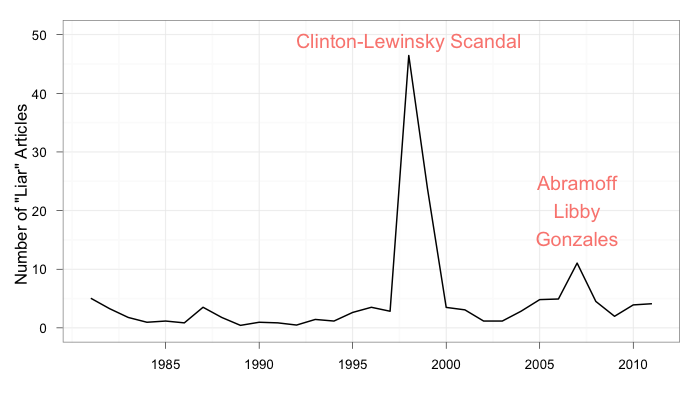Politicians never ‘lie’
With even a casually critical reading of the news, it becomes painfully clear that politicians are frequently truth challenged. Across the political spectrum, they all lie at times, regularly traversing the lie taxonomy, from exaggerations, deceptions and lies by omission, to outright fabrications.
Republican George W. Bush, for example, claimed that the vast majority of his tax cuts would go to the bottom end of the income spectrum. To the contrary, the non-partisan Tax Policy Center found that the wealthiest 20% reap the biggest breaks. Democrat Barack Obama, also distorting the consequences of his economic legislation, recently claimed his jobs bill would add far more workers than estimated by an independent group of economists.
The question of political veracity was recently brought to forefront by the surprisingly brazen lie Mitt Romney tells in one of his latest campaign commercials. In the ad, Obama is heard saying, "If we keep talking about the economy, we're going to lose," suggesting an admission of a failed economic policy. While Obama did in fact utter those words during the 2008 presidential campaign, his full statement was: "Senator McCain's campaign actually said, and I quote, 'If we keep talking about the economy, we're going to lose.'" Romney's advisers are unrepentant, lambasting complaints as being "hysterical". Ironically, Obama's original statement was itself deceptive. The quote was from an unnamed McCain strategist, and was not, as Obama suggests, a publicly stated position of the McCain campaign.
Without absolving the politicians themselves, this dismal state is at least in part attributable to journalists. Sifting through the last 30 years of New York Times articles, we find only a handful of political stories each year that explicitly characterize a statement to be a "lie". The Romney fib was not among them. (To his credit, Ryan Lizza at The New Yorker did use the L word in calling out Romney.) The Times kicked it into high gear for Monicagate, and managed to muster a bit of interest in the trifecta of back-to-back lies by Jack Abramoff, Lewis "Scooter" Libby and Alberto Gonzales. The vast majority of these "liar" articles, however, are either opinion or "he said, she said" pieces, which do not definitively establish a proclamation to be false. The remaining articles primarily report on self-admissions of guilt (e.g., Anthony Weiner), or lies as determined by a court (e.g., Libby). In short, over the past three decades, there are remarkably few instances of reporters at the New York Times independently and explicitly calling out deceitful politicians. Even the Obama campaign, responding to Romney's ad, steered clear of the word, instead characterizing Romney as a "serial deceiver." Though Anderson Cooper thought the 'liar' epithet appropriate for Syria's dictatorship.
One could argue that a desire to remain objective dissuades journalists from characterizing their subjects as liars. The current state of affairs, however, in which reporters are unwilling to call out obviously false statements, seriously undermines the value of journalism. A core function of the media is to separate fact from fiction, to evaluate and challenge statements made by political players so as to present an accurate, informative and complete story to readers. If not, then soon we'll be reduced to nothing more than our phonemes.
Methodology: To estimate the number of "liar" articles, the New York Times API was used to pull all U.S. political stories in which the word "lie" (in any grammatical form) occurred along with at least one other word indicating deceit (e.g., "untruth", "misleading", etc.). After inspecting a random sample of these articles, approximately half were seen to detail a specific lie (as opposed to lying in abstract terms, or used in an entirely different manner, as in "lie down"), from which annual numbers were estimated and plotted.
The post is adapted from a version that first appeared on the blog Messy Matters.
Sharad Goel is a Senior Research Scientist in the Microeconomics and Social Systems group at Yahoo! Research. He holds a Ph.D. in Applied Mathematics from Cornell. Sharad blogs regularly at Messy Matters, and you can follow him on Twitter @5harad. The illustration was created by Kelly Savage.
Other popular Yahoo! News stories:
Romney is still out front in the prediction markets
Jon Huntsman to Americans: Trust me
Why Rick Santorum dined alone at Iowa City's Hamburg Inn
Want more? Visit The Signal blog or connect with us on Facebook and follow us on Twitter.


